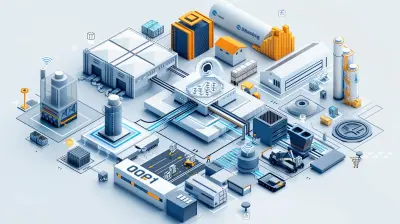13 December 2024
Let’s be real: B2B buyer behavior isn’t as straightforward as grabbing a coffee on your way to work. It’s more like navigating a maze, blindfolded, with a map written in another language. If you’ve been in the B2B space long enough, you know exactly what I mean. The buying process is far from a one-person affair—it’s messy, multi-layered, and involves more decision-makers than you'd expect.
But here’s the thing: understanding the ins and outs of B2B buyer behavior is your golden ticket to cracking sales, dominating the market, and building long-lasting relationships with your clients. So, how do you map out the mind of a B2B buyer? Buckle up because we’re about to dive deep into the complexities of it all.
What Makes B2B Buying So Complicated?
You’d think buying decisions in businesses would be logical, rational, and purely need-based, right? Wrong. While B2B buying certainly involves facts and figures, it’s also heavily influenced by emotions, opinions, and even office politics. Crazy, right? Let's peel back the layers.1. It’s Never a One-Person Show
Unlike B2C (where you’re trying to convince one person to add a product to their cart), B2B purchases involve a whole cast of characters. You’ve got decision-makers, influencers, end-users, gatekeepers, and sometimes even external consultants—all throwing in their two cents. It’s like trying to organize a group vacation: everybody has an opinion, but no one can agree on where to go.Each individual brings their own priorities to the table:
- The CFO wants cost savings.
- The IT team demands functionality and security.
- Marketing needs something that supports brand goals.
- And the CEO? They want ROI, yesterday.
2. The Lengthy Buying Process
If B2C buying is a sprint, B2B buying is a marathon. It’s not uncommon for deals to drag on for months—or even years. Why? Because companies don’t take decisions lightly when tens of thousands (or millions) of dollars are on the line. There are RFQs, RFPs, endless meetings, and numerous rounds of negotiations to survive. And let’s not forget the killer "silent treatment" phase when prospects seem to disappear into thin air.3. Higher Stakes, Bigger Risks
In B2B, the stakes are high. A wrong purchasing decision can cost a business time, money, and maybe someone’s job. It’s not like buying the wrong pair of shoes that you can return. This fear of "getting it wrong" makes B2B buyers cautious and methodical. Trust becomes the currency of every transaction.
The Psychology Behind B2B Buyer Decisions
So, what’s really going on in the mind of a B2B buyer? Despite the complex layers, their decision-making is driven by a mix of logic and emotion. Let’s break it down:1. The Need for Validation
B2B buyers crave validation—whether it’s through customer reviews, case studies, or recommendations from their peers. They want to know, "Am I making the right choice? Have others succeeded with this product/service?" Think of it this way: it’s like checking Yelp before committing to that new sushi place. No one wants to be the guinea pig when making costly business decisions.2. The Fear of the Unknown
Uncertainty is the enemy of progress. B2B buyers are paranoid about the "what ifs." What if the product doesn’t deliver? What if the vendor disappears after the sale? What if this choice makes me look bad in front of my boss? Your job as a business is to eliminate these fears by providing clear answers, measurable results, and stellar customer support.3. Emotional Attachments to Brands
Look, even in the B2B world, people are people. And people love to feel personally connected to brands. Whether it’s a vendor who consistently goes the extra mile or a product that makes their life easier, emotional connections play a major role. Never underestimate the power of good vibes.
Winning Over Today’s B2B Buyer
Now that you know why B2B buying is so complicated, let’s talk about how to simplify it for your prospects. Spoiler alert: it’s all about building trust, creating value, and staying top of mind.1. Be a Master of Research
B2B buyers hate generic pitches. They can sniff out a cookie-cutter email in seconds. Instead, do your homework. Know their pain points, their industry challenges, and their goals. When you position yourself as a partner who truly understands their business, you’re halfway there.2. Create Content That Speaks to Them
Your website should be a treasure trove of insights, not a digital brochure. Publish thought leadership articles, case studies, whitepapers, and how-to guides that solve their problems. Show them how you’ve helped companies just like theirs. And don’t forget the power of SEO! If they can’t find you on Google, you don’t exist.3. Simplify the Decision-Making Process
If your sales process is harder to navigate than the DMV, you’re going to lose prospects. Make it easy for them to get the info they need, book a demo, or request a quote. Offer clear pricing, transparent terms, and—this is key—a dedicated point of contact to guide them through the journey.4. Nurture the Relationship
Some buyers are ready to pull the trigger immediately. Most are not. That’s okay. Keep the relationship warm by nurturing them with email campaigns, personalized offers, and timely check-ins. Remember, trust isn’t built overnight.5. Prove Your Value—with Data
B2B buyers love numbers. Help them justify their decision with hard data. Show them how your product/service improves efficiency, reduces costs, or increases revenue. Include real-world stats and ROI projections wherever possible.
The Role of Technology in Shaping B2B Buyer Behavior
Let’s not ignore the elephant in the room: technology is flipping the B2B world on its head. The modern B2B buyer is more informed, self-reliant, and tech-savvy than ever before. And that changes everything.1. Online Research Rules
Did you know that 70% of B2B buyers complete significant research online before contacting a vendor? That means your online presence is your first impression. Is your website optimized? Are you ranking on search engines? Is your LinkedIn game strong? If not, you’re leaving money on the table.2. The Rise of Digital Tools
From CRM software to automated email marketing, technology enables businesses to understand and cater to buyer behavior on a whole new level. Data analytics tools, in particular, are a game-changer for tracking buyer journeys and predicting future needs.3. Social Media’s Growing Influence
Don’t underestimate the power of social media in the B2B space. Platforms like LinkedIn are where decision-makers hang out and engage with content. If you’re not leveraging social media, you’re missing out on valuable connections.Common Myths About B2B Buyer Behavior (Debunked)
Let’s clear up some misconceptions that might be clouding your strategy:Myth #1: Price Is Everything
Sure, budget matters, but it’s not the only factor. B2B buyers care about quality, reliability, and long-term value. You don’t have to be the cheapest—just the smartest choice.Myth #2: Emails Don’t Work Anymore
Actually, email is alive and kicking. In fact, it remains one of the most effective channels for B2B marketing. But spammy, irrelevant emails? Those don’t work. Personalization is the name of the game.Myth #3: B2B Buyers Are All About Logic
We’ve already established that emotion plays a role, too. Don’t treat buyers like robots—connect with them on a human level.Final Thoughts: Embrace the Complexity
Navigating the complexities of B2B buyer behavior can feel like a game of chess: strategic, intricate, and always evolving. But once you understand what makes buyers tick, you’ll be in a much stronger position to meet their needs, win their trust, and close the deal. Remember, it’s not about selling a product—it’s about solving a problem and building a partnership.So, bring your A-game, do your research, and never underestimate the power of good old-fashioned empathy. Because at the end of the day, B2B buyers are human too.














Jemima Brown
Understanding B2B buyer behavior transcends mere transactions; it delves into the nuances of trust, relationship dynamics, and emotional intelligence. In a world driven by data, the human element remains pivotal in fostering lasting partnerships and driving meaningful engagement.
February 9, 2025 at 3:17 AM